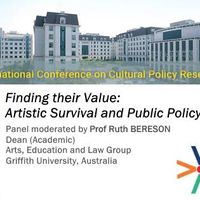10th ICCPR: The cultural governance of global flows Key Messages

What is the ICCPR?
The International Conference on Cultural Policy Research (ICCPR) is an ambitious biennial event in cultural policy research which provides a unique opportunity for academics to present their recent work in the area of culture and arts policies. It covers a wide panorama of academic disciplines, theories, methods and case-studies exploring the meaning, function and impact of cultural policies globally and locally.
The previous edition of the ICCPR took place in Asia the first time, in Seoul (Read the full report of ICCPR 2016 by Dr. Marcin Poprawski here), and this year’s Conference was held in one of the most vibrant cities of northern Europe, namely Tallinn, the capital of Estonia. The ICCPR 2018, hosted by Tallinn University and supported by the European Union Regional Development Fund, offered a wide range of 85 panels (roundtable discussions, thematic research sessions) and over 300 presentations by researchers and culture experts.

10th ICCPR in University of Tallinn, Estonia
The 2018 Conference was titled ‘The Cultural Governance of Global Flows: Past and Future’. The featured topic was framed by 4 keynote lectures: on global cultural flows in relation to our interests and values, by Prof. J.P. Singh (University of Edinburgh, UK), on cultural policies and post-communism from the de-colonial perspective, by Prof. Madina Tlostanova (Linköping University, Sweden), on public values in an online world, by Prof. Jose van Dijck (Utrecht University, Netherlands) and on Netflix and the rise of transverse, transnational flows, by Prof. Joseph Straubhaar (University of Texas at Austin, USA).
The main theme of the 4-day meeting referred to the complexities and challenges of global flows that present societies are faced with. The emergent global processes are explicitly or implicitly shaping cultural policies and impacting the organisational conditions for arts and culture around the world. Migration, new global divisions in cultural labour and cultural tourism were mentioned as core issues.
The emergent global processes are explicitly or implicitly shaping cultural policies and impacting the organisational conditions for arts and culture around the world.

Tallinn, Estonia
The choice of Estonia as a location for a conference focused on current cultural global flows was not a random one. This small, northern country at the periphery of Europe is one of the global leaders in digitising public services, including access to cultural offers: yet, as a very small country, it has been powerless to negotiate with the increasingly hegemonic international platforms and the global providers of digital distribution channels in order to improve service quality, data access and security.
The role of the state in protecting and promoting the diversity of cultural expressions is intensely challenged by the digital age realities.
7 key themes of mutual relevance to Asia and Europe
There were at least 7 cultural policy related themes[1] that emerged as common interests and of mutual relevance to Asia and Europe that were discussed in the presence of over 40 researchers from Asia.
Digital cultural policies
Several sessions focused on digital cultural policies, digitalisation[2] and co-creation in cultural practices, as well as digital soft power governmental strategies and the evaluation of digital media and their complex flows. The strongly connected and pertinent issue was the ICT and data use in cultural institutions, including its implication on ethnic minorities in multicultural states. The role of the state in protecting and promoting the diversity of cultural expressions is intensely challenged by the digital age realities.
Cultural diplomacy
The second dominant theme relates to the solutions beyond cultural diplomacy as new global tensions arise from increased cross-border flows. Alongside this issue are some notions of cosmopolitan cultural policy as a response to global flows. The thematic area of cultural diplomacy was discussed in a separate panel devoted to UNESCO’s cultural policies over decades.
Reframing arts education
The third essential topic revolved around reframing the systemic practices and policies of arts education, as well as the role of arts universities under the influence of global flows.
Creative industries
The fourth area of discussion was the multidimensional relationship of the creative industries and cultural policies, reflecting the mutual impact of new business models of creative entrepreneurship, industrialised creative processes and other emerging forces on cultural policies around the world

10th ICCPR in University of Tallinn, Estonia
Cultural policy
The fifth thematic area is cultural policy at its core notion, with several extensions. This is, above all, focused on cultural and governance centralisation vs. autonomy and the issue of local cultural policy related to systemic solutions for local arts and culture organisations and small communities, exemplified by cases from Japan, Finland, Estonia, and other countries. Among the imperatives discussed were evidence-based and participatory approaches. The topic of cultural policy also covered urban development issues, cultural mapping, and the constant reinterpretation of the notion of the ‘creative city’. Some reflections on culture journalism as an instrument of cultural policy, and on the values and attitudes of arts criticism and culture journalism, were very intriguing contributions to the conference.
Diversity
Diversity is the sixth thematic area that was addressed – this included another session related to the role of UNESCO and its impact, focusing on the 2005 Convention on the Diversity of Cultural Expressions, the culture and language policies in minority nations, and the protection of the cultural identity of migrants. The key question here is how to adapt UNESCO activity to new challenges, including the digital environment of cultural expressions. Diversity was also raised during discussions on the topic of the roles of cultural organisations on ethnic minorities and migrant communities.
Cultural values
The last topic was the general notion of values, and cultural values in particular, when paired with cultural governance, as seen in different national and cross-national contexts. The problem of the institutionalisation of values in public cultural realms seemed to recur in discussions here. The question of methods for addressing, measuring and researching values in practice also emerged as a key problem.
There is a need for well-balanced, longitudinal cultural policy studies focused on the careers, roles and statuses of artists around the world, in terms of their exposure to global flows as well as local political pressures.
Conclusion
The aim of this report is to summarise the proceedings of ICCPR 2018, highlighting key thematic areas and challenges in cultural policy relevant for Asia and Europe. I would like to conclude my selection of the key problems discussed within the framework of this edition of the conference with two areas of reflection.
The first thematic section of the 10th ICCPR meeting that needs to be recalled here is the discussions pertaining to cultural heritage and museum policies. This is even more essential when discussed in the context of the 2018 European Year of Cultural Heritage. The conference tackled several key aspects relevant for this cultural policy fundamental, including museum policies, the impact of the policies and practices of the creative industries on heritage institutions, and the analysis of the professionalisation of museums. There was also much reflection on content within cultural identities, boundaries and heritage based on cases from Asia and Europe. The topic that electrified some of the conference audience were the dilemmas of heritage and copyrights.
The second and final area I wish to conclude this report with is the problem of cultural labour or the working conditions of artists, including inequalities and the issues with social mobility associated with cultural and creative occupations. This is as much a cultural policy topic as a problem with the social and human qualities of cultural organisations as workplaces. There is a need for well-balanced, longitudinal cultural policy studies focused on the careers, roles, and statuses of artists around the world, in terms of their exposure to global flows as well as local political pressures. The discussions will continue and the pendulum of the ICCPR is going to swing again to the Asian side, as the 2020 Conference will take place in Kyoto, to be hosted by Doshisha University.
Cover image: Copyright ICCPR
---------------------------------
Follow the story at #ASEFculture #ICCPR2018 #OpEd
This report was commissioned by the Asia-Europe Foundation (ASEF) and prepared by Dr Marcin Poprawski under the Culture Department’s work in cultural policy. It is based on the discussions and paper presentations at the 10th International Conference for Cultural Policy Research (21-25 August 2018, Tallinn, Estonia).
Dr Marcin Poprawski is the Deputy Dean of the Faculty of Social Sciences at Adam Mickiewicz University (AMU) in Poznan, Poland, and works in the Institute of Cultural Studies at the AMU. He is also a co-founder and research coordinator of the ROK AMU Culture Observatory. Since 2006, he has been lecturing at the Viadrina European University in Frankfurt, Oder.
[1] Most of them resonated as well with few key policy issues highlighted in UNESCO’s Global Monitoring Report – Re-shaping Cultural Policies – Advancing Creativity for Development – 2005 Convention Global Report (UNESCO, December 2017).
[2] The digitalization as the ICCPR 2018 leading topic was discussed as well in the very insightful report by Giulia Lasen published here: http://www.tafterjournal.it/2018/09/15/three-ideas-for-further-reflection-from-iccpr-2018/
Similar content
deadline
22 Jan 2018
from - to
05 Jul 2016 - 09 Jul 2016
18 Jul 2016
deadline
28 Feb 2015






